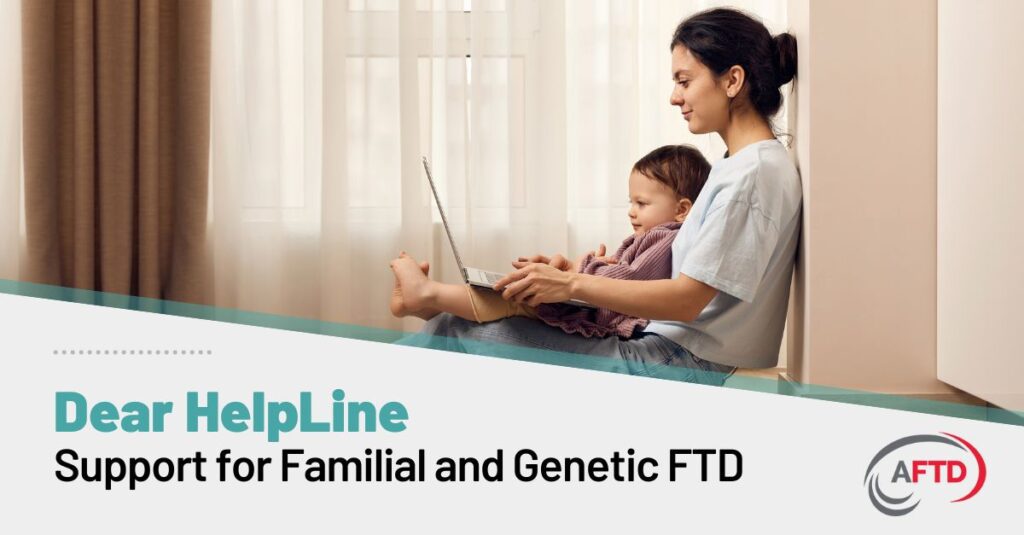Dear HelpLine: Support for Familial and Genetic FTD

Dear HelpLine,
My mom was recently diagnosed with FTD; my late uncle and grandmother had dementia, and I’m concerned that this may be genetic. Is there support for people facing uncertain genetic status?
Most people diagnosed with FTD have a sporadic form of the disorder, meaning there is no apparent familial history of neurodegenerative disease. However, at least 20% of people diagnosed have a genetic cause for their FTD, and in many cases, the FTD-causing genetic variant can be passed along to future generations.
Genetic FTD poses unique challenges. Family members caring for loved ones who have been diagnosed see firsthand how FTD may impact their own future, or that of a sibling or child. Additionally, some families with genetic FTD find themselves with multiple family members experiencing FTD symptoms at the same time.
Clinical trials for potential FTD treatments are making progress, and because many of those trials focus specifically on genetic FTD, more people are considering predictive genetic testing; knowing your genetic status is increasingly a prerequisite to participating in leading-edge FTD research. People not currently experiencing FTD symptoms can gain insight into their own risk of developing FTD through predictive testing. But while confirming your genetic risk may alleviate the anxiety of not knowing, it is also information that cannot be unlearned. The decision to have predictive testing is highly personal. Before testing, AFTD recommends consulting a genetic counselor who can help you decide if knowing your future risk is the right decision for you at this point in your life.
Regardless of the decision to test now or defer, the presence of FTD in one’s family presents additional concerns – which, if allowed to fester, can increase the isolation brought on by FTD. Having access to a community of people who understand your situation can be a lifeline.
For people impacted by either genetic or sporadic FTD, AFTD’s support groups offer the opportunity to connect with others who know what FTD is and how it affects families. Support groups let you talk with people who are going through similar experiences and make invaluable connections. You can cry, vent, and laugh with no judgment. Groups are safe spaces where you can be yourself and talk as much or as little as you need. You can hear from others about their experiences and learn about how they approached circumstances similar to yours.
AFTD offers numerous types of support groups, and we recently introduced two different groups specifically for those facing genetic FTD.
Our Persons at Genetic Risk Peer Support Group is for people without symptoms who have undergone predictive testing and understand that they have a confirmed genetic risk to develop FTD. Members talk about how they grapple with important life decisions and cope with the knowledge of their genetic status.
The Familial FTD Peer Support Group is for asymptomatic people who know that FTD in their family is caused by a specific gene, but for various reasons have yet to undergo genetic testing themselves, or perhaps they are weighing the option of undergoing predictive genetic testing. This group is also for those who have been tested, but have chosen to not know their results.
For more information about AFTD’s support groups, please contact the HelpLine at 1-866-507-7222 or info@theaftd.org
Additional resources:
- FTD Disorders Registry is a powerful tool in the movement to discover cures for genetic and sporadic FTD.
- Cure VCP Disease is a patient advocacy organization devoted to raising awareness and finding a cure for disorders caused by pathogenic variants in the VCP gene, including FTD.
- Cure MAPT FTD is devoted to increasing awareness and encouraging researchers to focus on finding a cure for FTD caused by pathogenic variants in the MAPT gene.
- End the Legacy is a patient-led group focused on advocacy and research towards a cure for genetic FTD and genetic ALS.
By Category
Our Newsletters
Stay Informed
Sign up now and stay on top of the latest with our newsletter, event alerts, and more…
